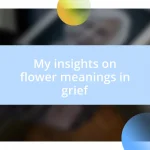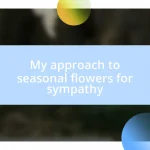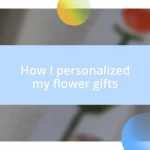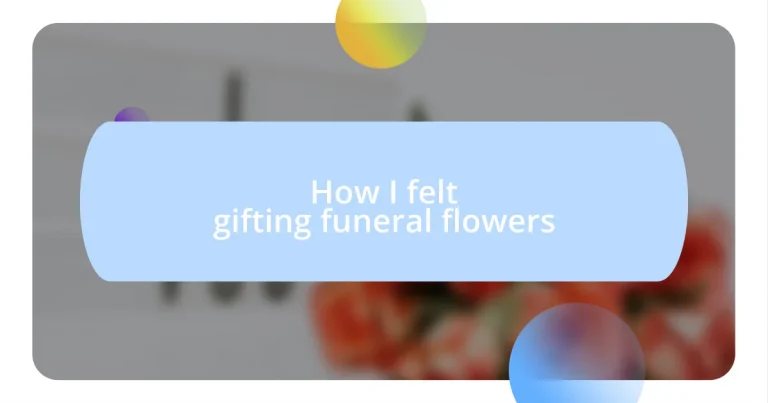Key takeaways:
- Gifting flowers during times of loss evokes deep emotions, offering solace and connection that words often fail to convey.
- Certain flowers can capture personal memories and meanings, making the gesture more heartfelt and significant.
- Supporting grieving friends through thoughtful gestures, such as flowers, handwritten notes, and shared moments, fosters communal healing and emotional comfort.
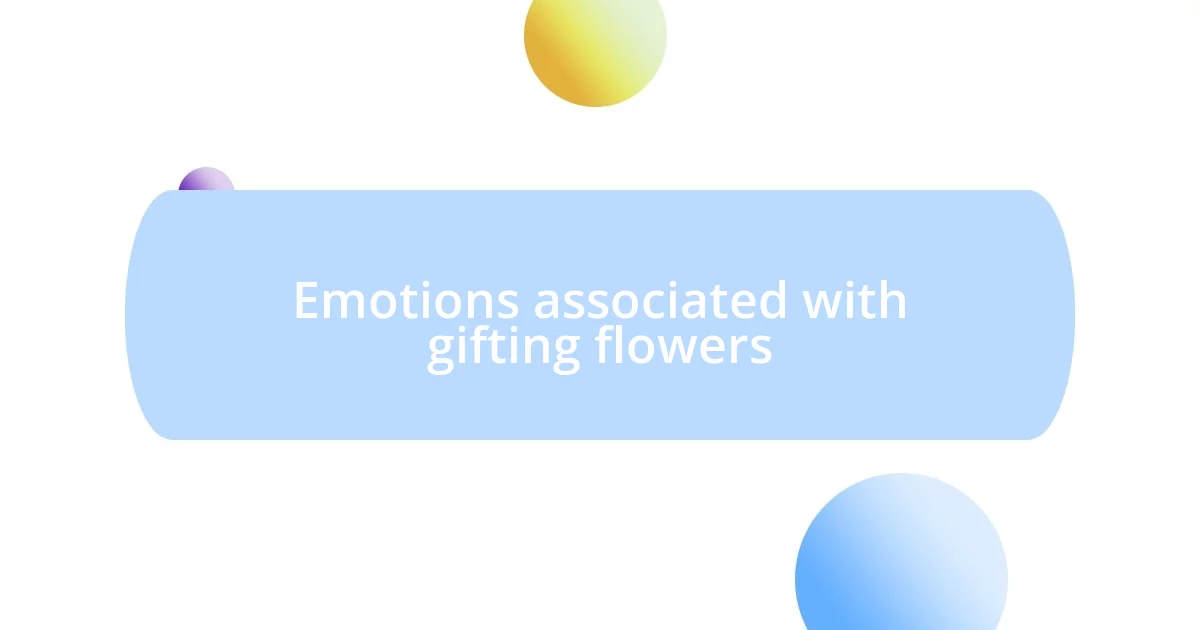
Emotions associated with gifting flowers
Gifting flowers, especially in times of loss, can stir a complex mix of emotions. I remember a time when I chose a simple bouquet of white lilies for a friend who had just lost a loved one. The act felt both heavy and heartfelt—there was a sense of connection, even amidst the sadness, as if the flowers could communicate feelings that words often fail to convey.
When I handed over those flowers, I was overwhelmed by a profound sense of empathy. It seemed like a small gesture, yet it carried the weight of compassion. Have you ever felt that moment where your heart truly reaches out to someone else? I realized then that flowers aren’t just about beauty; they embody our shared experiences of grief and remembrance.
The emotions tied to gifting flowers can also bring a sense of solace. I vividly recall receiving a bouquet while going through a tough time; it provided a comforting reminder that I wasn’t alone in my sorrow. Isn’t it interesting how something so simple can evoke feelings of support and love? In those moments, flowers become more than an object—they become a lifeline, bridging the gap between our hearts during difficult times.
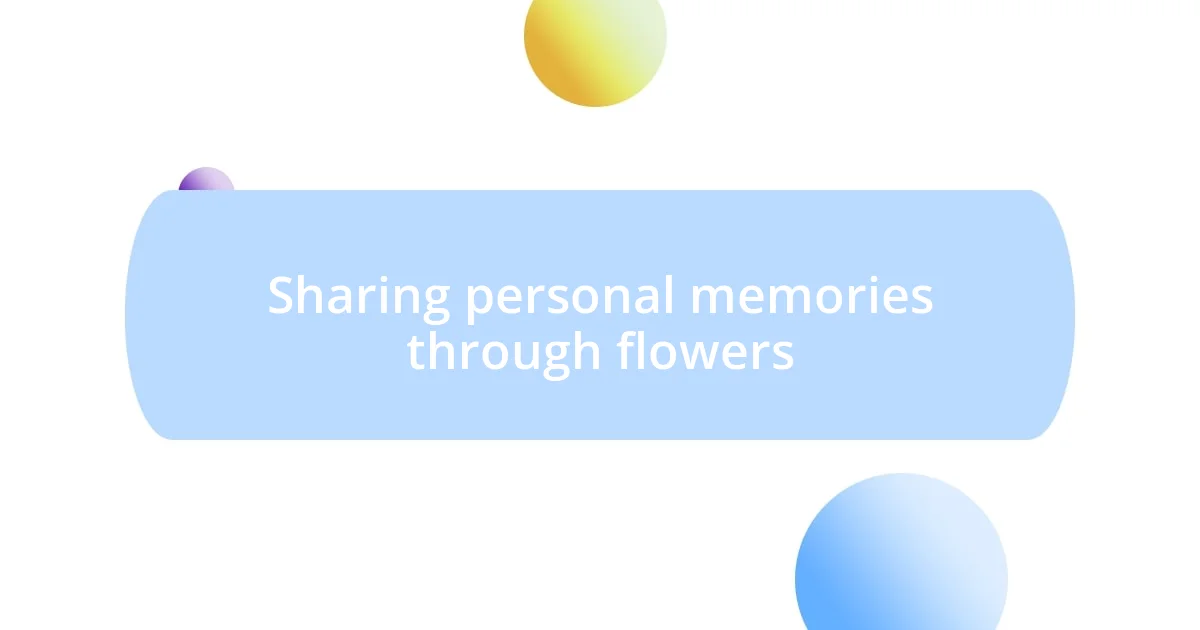
Sharing personal memories through flowers
When I think about sharing personal memories through flowers, I remember the moment I chose sunflowers for a close family friend who had recently lost her grandmother. Sunflowers, with their bright, golden faces, seemed perfect to convey the warmth of the memories they shared. These flowers sparked joyful recollections of her grandmother’s garden, radiating love and nostalgia that uplifted her spirits amidst the grief.
Reflecting on this, I’ve learned that certain flowers resonate deeply with our experiences and memories. Here’s how flowers can encapsulate personal stories:
- Each flower has a meaning: For instance, roses often symbolize love, while daisies represent innocence, reminding us of cherished moments.
- Personal connections: Gifting a favorite flower can stir memories linked to specific experiences or individuals, making the gesture more heartfelt.
- Color significance: The colors chosen can evoke emotions tied to the departed, each hue speaking volumes about their personality and the life they lived.
Giving flowers doesn’t just honor the deceased; it preserves the memories we shared with them, leaving a lasting tribute that intertwines our grief with love.
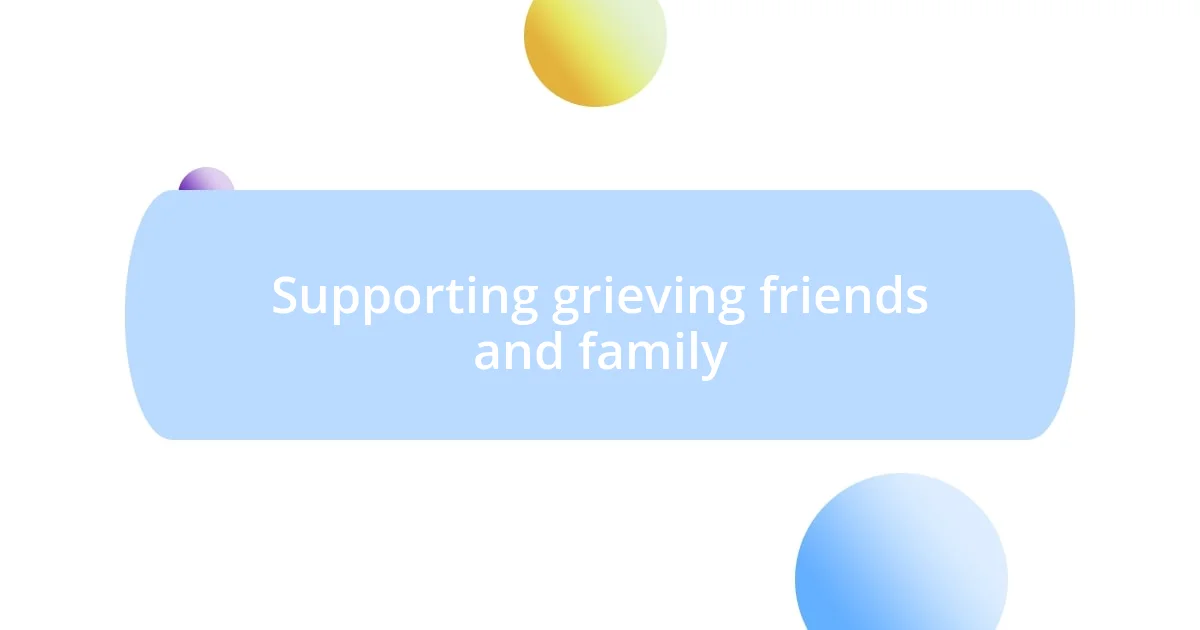
Supporting grieving friends and family
Supporting grieving friends and family can be one of the most compassionate gestures we can offer during difficult times. When I learned about a colleague’s loss, I wanted to accompany my flowers with a handwritten note. That personal touch transformed my gift into a heartfelt message, making my friend feel seen and cared for. Have you ever noticed how just a few written words can provide an unexpected glimmer of comfort in sadness?
In another instance, I decided to organize a small gathering for a friend who had recently lost her father. I brought along a centerpiece of peaceful blue hydrangeas, and we shared stories about him. It was fascinating to see how the flowers created a nurturing environment, encouraging open conversations about grief. By sharing laughter and tears around that floral arrangement, we collectively honored a life lived while finding solace in our togetherness.
Sometimes, supporting grieving friends means simply being present. I recall sitting in silence with a friend over a bouquet that sat untouched on the table. That presence felt like a warm hug, offering comfort without the need for words. It’s incredible how the mere act of sharing space can speak volumes about our support, helping to bridge the gap left by loss.
| Method of Support | Emotional Insight |
|---|---|
| Gifting flowers | Shows thoughtfulness and love during a difficult time. |
| Writing a heartfelt note | Transports emotions and offers personal connection. |
| Organizing gatherings | Encourages shared memories and communal healing. |
| Being present | Provides emotional comfort through silent companionship. |

Tips for delivering funeral flowers
When delivering funeral flowers, timing can make a significant difference. I remember once showing up just before the service with a bouquet of elegant white lilies, and how it instantly created a peaceful ambiance in the room. Have you considered what it feels like to be surrounded by flowers that reflect love and respect during such a heavy moment?
It’s also essential to consider the presentation. I’ve learned that simple touches can elevate the entire experience. For instance, I often choose a beautiful wrapping or a sleek vase to ensure the flowers not only look stunning but also convey the thoughtfulness behind the gesture. It’s fascinating how a little detail can brighten a grieving person’s day and make them feel cherished.
Don’t forget to communicate with the family beforehand, if possible. I once reached out to a friend whose loved one had passed away, asking what flowers would resonate best with them. This small act strengthened our bond, reminding me how thoughtful gestures can lead to deeper connections during challenging times. Isn’t it profound how flowers can become a language of love and remembrance when tailored to each unique situation?
